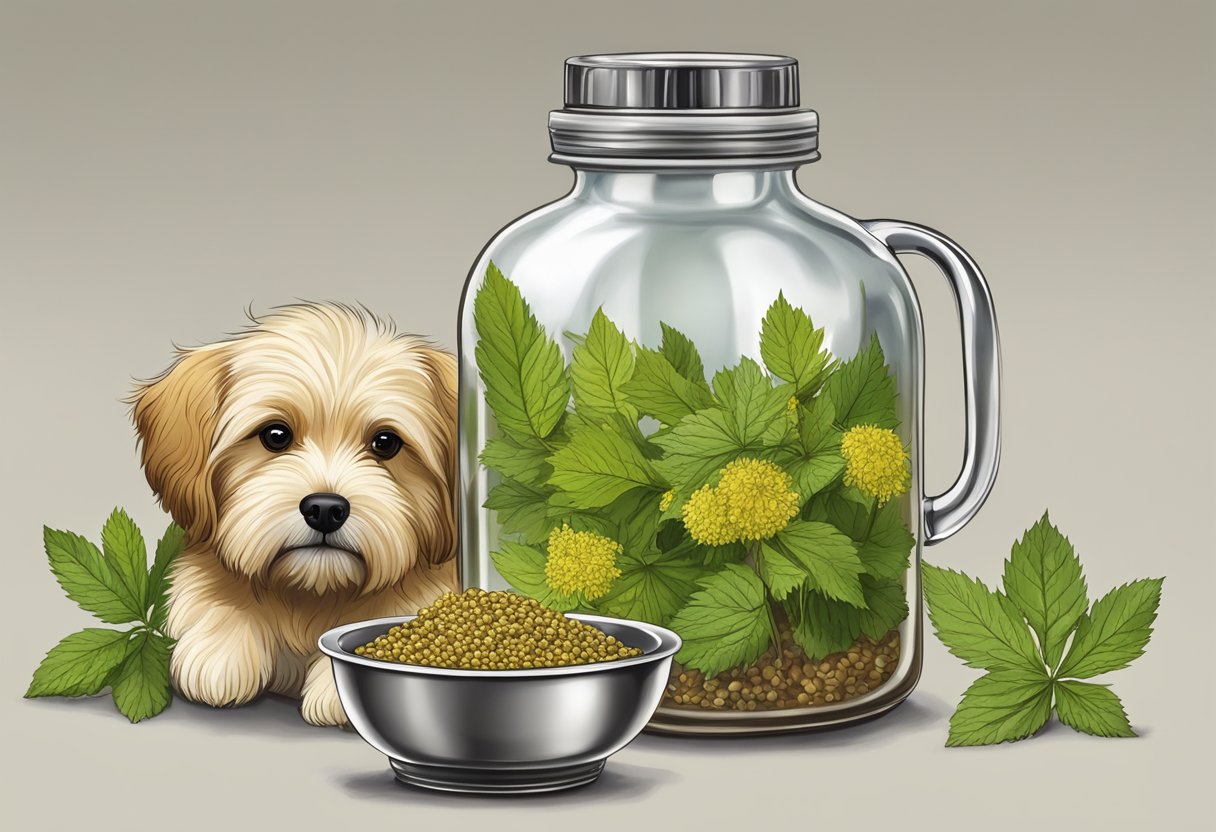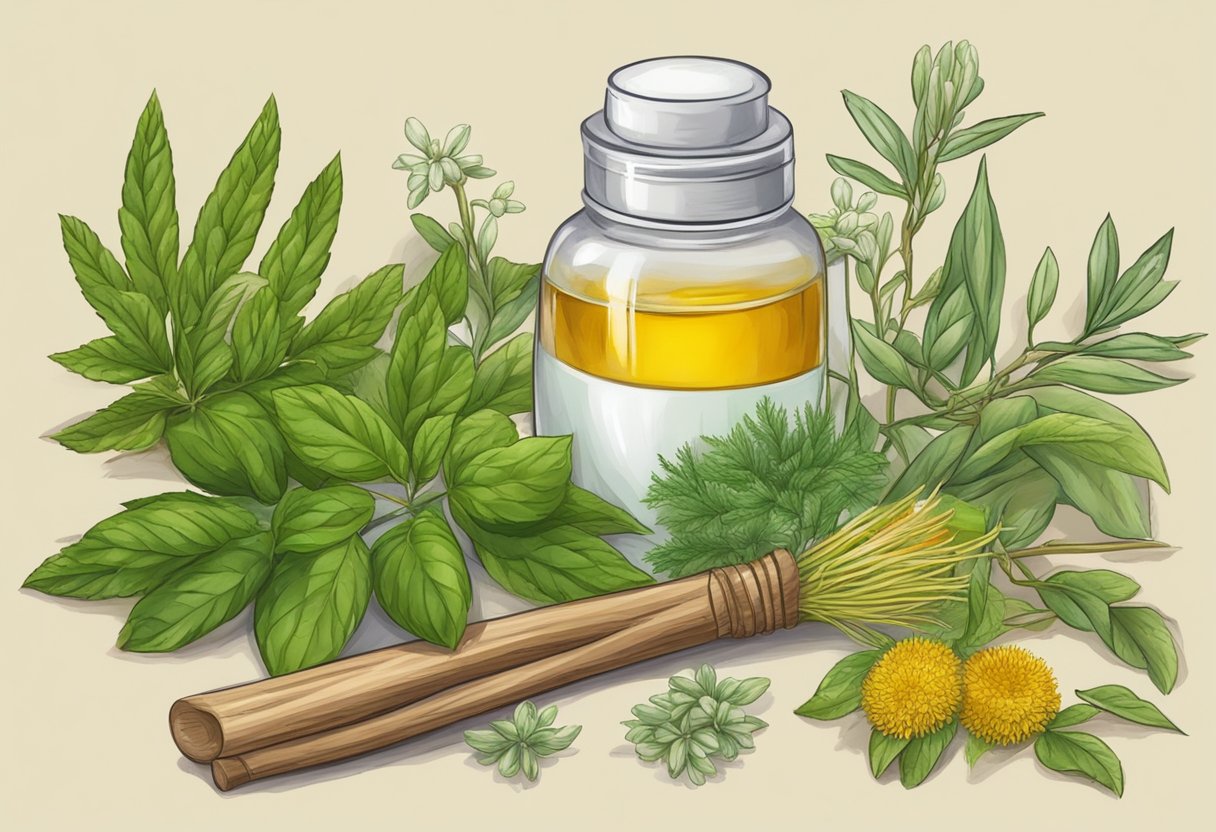Goldenseal is a popular herb that has been used for its medicinal properties for centuries. It has been used to treat a variety of ailments, including digestive problems, respiratory infections, and skin conditions. While goldenseal is generally considered safe for human consumption, many pet owners wonder is goldenseal safe for dogs and other pets. In this article, we will explore whether goldenseal is safe for dogs and what the potential benefits and risks are.
Disclaimer: This article is provided for informational purposes only and should not replace professional medical advice. Please consult with a qualified healthcare practitioner or herbalist before using any herbal remedies.
Understanding Goldenseal, Goldenseal, also known as Hydrastis canadensis, is a perennial herb that is native to North America. The plant has a long history of use in traditional medicine, and its roots and rhizomes are used to make supplements and extracts. Goldenseal contains several active compounds, including berberine, hydrastine, and canadine, which are believed to have antimicrobial and anti-inflammatory properties.
Key Takeaways
- Goldenseal is a popular herb that has been used for centuries to treat a variety of ailments.
- While goldenseal is generally considered safe for human consumption, pet owners may wonder if it is safe for their dogs.
- Goldenseal contains several active compounds that are believed to have antimicrobial and anti-inflammatory properties.
Understanding Goldenseal
Goldenseal (Hydrastis canadensis) is a perennial herb native to North America. It has been used for centuries by Native Americans as a medicinal plant to treat a variety of ailments such as digestive issues, respiratory infections, and skin conditions. Today, goldenseal is still used as a popular herbal remedy for many health conditions.
Goldenseal contains several active compounds, including berberine, hydrastine, and canadine. These compounds are believed to have antibacterial, anti-inflammatory, and immune-boosting properties. Goldenseal is often taken in the form of capsules, tinctures, or teas.

However, it is important to note that goldenseal is not without its potential risks and side effects. Goldenseal can interact with certain medications, such as blood thinners and medications for high blood pressure, and may cause adverse reactions. Additionally, goldenseal has been shown to have toxic effects on the liver when taken in high doses.
When it comes to using goldenseal for dogs, there is limited scientific research available. It is important to consult with a veterinarian before giving goldenseal to your dog as it may not be safe for all dogs and may interact with other medications your dog is taking.
In summary, while goldenseal has been used for centuries as a medicinal plant, it is important to use caution when taking it as it may have potential risks and side effects. When considering using goldenseal for dogs, it is important to consult with a veterinarian to determine if it is safe and appropriate for your dog’s specific needs.
Goldenseal in Veterinary Medicine
Goldenseal (Hydrastis canadensis) is a medicinal herb that has been used for centuries to treat various ailments in humans. However, its use in veterinary medicine is still a topic of debate among experts. While some veterinarians recommend goldenseal for pets, others are skeptical about its safety and efficacy.
Animal studies have shown that goldenseal may have some potential benefits for pets. For instance, a study published in the Journal of Ethnopharmacology found that goldenseal root was used for uterine infections in pets. However, the study also found that a high dose of goldenseal extract was ineffective in treating the infection. Therefore, it is important to use goldenseal in the correct dosage to avoid any adverse effects.
Pet owners should also be aware that goldenseal may interact with other medications that their pets are taking. For instance, goldenseal may increase the risk of bleeding when taken with blood thinners. Therefore, it is important to consult with a veterinarian before administering goldenseal to pets.
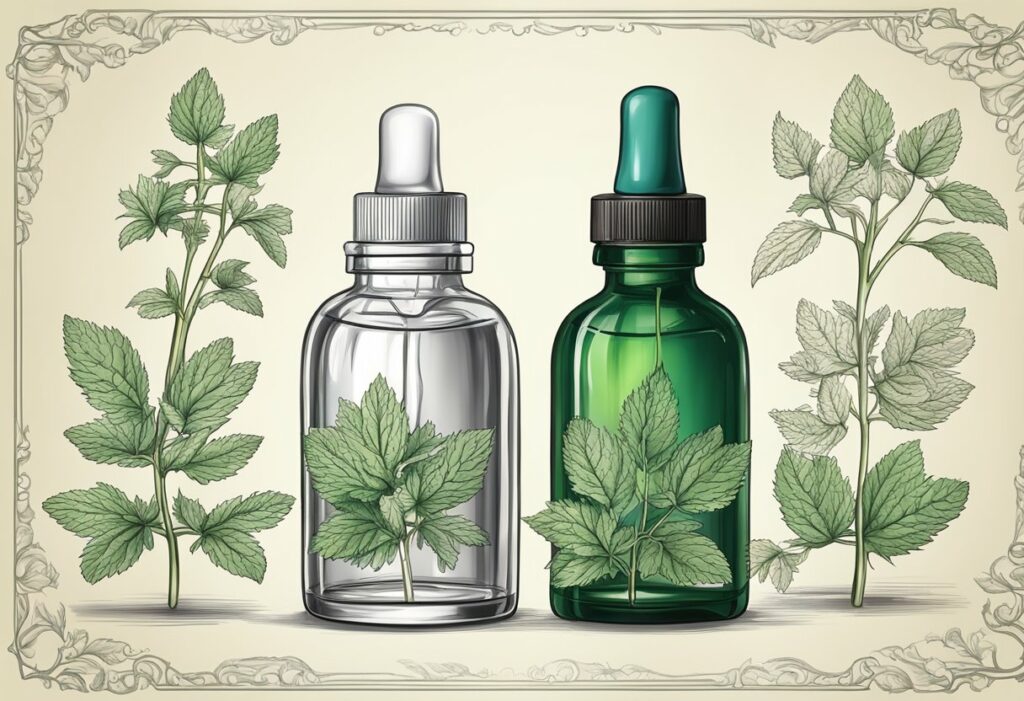
Despite the potential benefits of goldenseal, some veterinarians are still skeptical about its safety and efficacy. They argue that there is not enough scientific evidence to support its use in pets. Therefore, pet owners should exercise caution when using goldenseal and consult with a veterinarian before administering it to their pets.
In conclusion, goldenseal may have some potential benefits for pets, but its use in veterinary medicine is still a topic of debate. Pet owners should exercise caution when using goldenseal and consult with a veterinarian before administering it to their pets.
Active Ingredients in Goldenseal
Goldenseal is a popular herb that has been used for centuries to treat various ailments in humans and animals. The root of the goldenseal plant is the most commonly used part and is available in various forms, including goldenseal root powder, goldenseal root extract, goldenseal extract, and volatile oil.
The active ingredients in goldenseal are alkaloids, which are responsible for its medicinal properties. Berberine, hydrastine, and canadine are the primary alkaloids found in goldenseal. These alkaloids have been shown to have antimicrobial, anti-inflammatory, and immune-boosting properties.
Berberine is the most studied alkaloid in goldenseal and has been shown to have a wide range of health benefits. It has been used to treat diarrhea, respiratory tract infections, and skin infections. It has also been shown to have anti-cancer properties and may help lower blood sugar levels.
Hydrastine and canadine are less studied than berberine, but they are believed to have similar health benefits. They have been shown to have antimicrobial properties and may help lower blood pressure.
Goldenseal supplements are widely available, but it is essential to choose a high-quality product that contains standardized amounts of the active ingredients. It is also important to follow the recommended dosage and to consult with a veterinarian before giving goldenseal to your dog.
In conclusion, goldenseal contains several active ingredients that have been shown to have health benefits. However, more research is needed to fully understand the effects of goldenseal on dogs. It is always best to consult with a veterinarian before giving any supplements to your pet.
Health Benefits of Goldenseal for Dogs
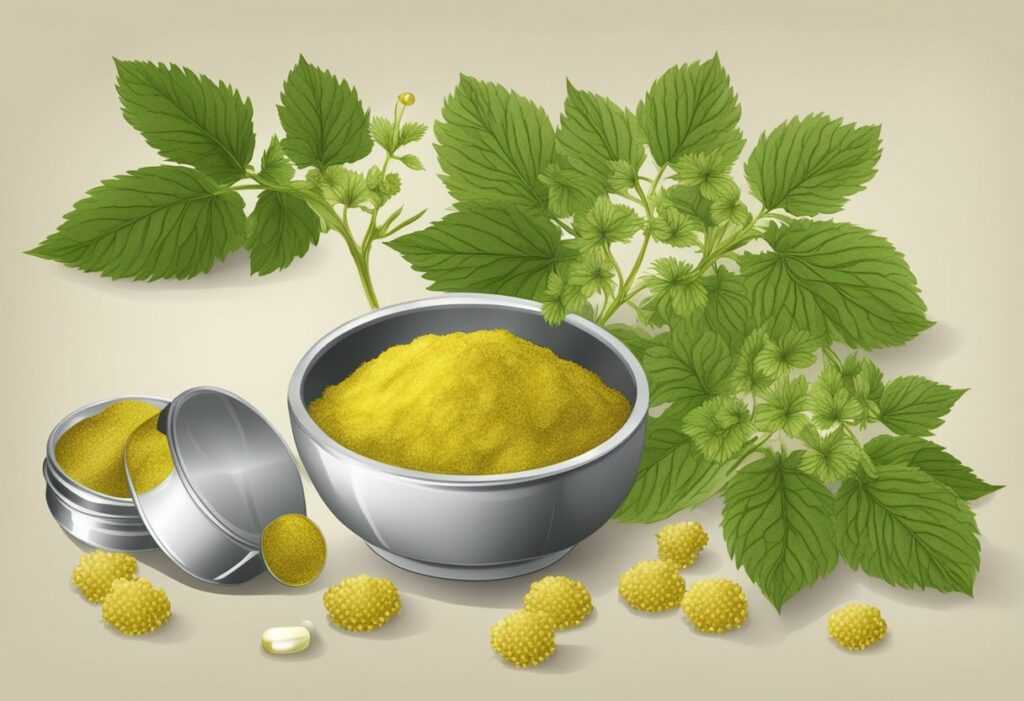
Goldenseal, also known as Hydrastis canadensis, is a herbaceous plant that has been used for centuries for its medicinal properties. While it is often used by humans, it can also be beneficial for dogs. Here are some of the health benefits of goldenseal for dogs:
Healthy Immune System
Goldenseal is known to have immune-boosting properties, which can help to keep your dog healthy. It contains compounds such as berberine and hydrastine that have been shown to stimulate the immune system and fight off infections.
Anti-Inflammatory Properties
Goldenseal also has anti-inflammatory properties that can help to reduce inflammation in your dog’s body. This can be particularly beneficial for dogs that suffer from joint pain or other inflammatory conditions.
Digestive Tract Health
Goldenseal can help to promote a healthy digestive tract in dogs. It contains compounds that can help to soothe the digestive system, reduce inflammation, and promote the growth of beneficial gut bacteria.
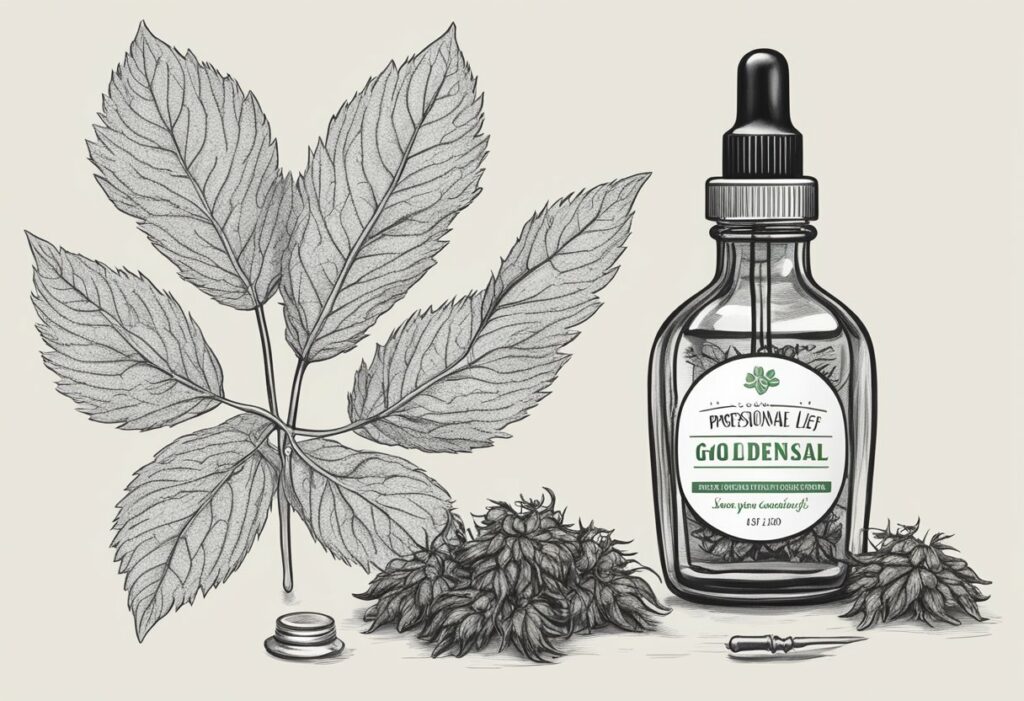
Digestive Issues
If your dog suffers from digestive issues such as diarrhea or vomiting, goldenseal may be able to help. It has antimicrobial properties that can help to kill off harmful bacteria in the digestive tract, while also promoting the growth of beneficial bacteria.
Antimicrobial Properties
Goldenseal has strong antimicrobial properties that can help to fight off infections in dogs. It has been shown to be effective against a wide range of bacteria, viruses, and fungi, making it a useful natural remedy for a variety of health conditions.
Overall, goldenseal can be a safe and effective natural remedy for dogs when used appropriately. However, it is important to consult with a veterinarian before giving your dog any new supplements or herbs, as they can interact with other medications or have side effects.
Potential Side Effects of Goldenseal
Goldenseal is a popular herb that is often used to treat various ailments in dogs. However, it is important to note that goldenseal can have potential side effects, especially when consumed in large quantities or for an extended period of time.
Adverse Effects
According to a study published in the journal Toxicity Potential of Nutraceuticals, goldenseal root powder can be toxic to dogs if consumed in large quantities. The study found that male dogs were more sensitive to the herb than female dogs.

Brain Damage
Another study published in the journal Goldenseal (Hydrastis canadensis L.) and its active constituents: a critical review of their efficacy and toxicological issues suggested that goldenseal may have neurotoxic effects. However, further research is needed to confirm this finding.
Upset Stomach
Goldenseal can cause upset stomach in dogs if consumed in large quantities or for an extended period of time. Symptoms of upset stomach may include vomiting, diarrhea, and loss of appetite.
Hypoglycemic Dogs
Goldenseal can lower blood sugar levels in dogs, which can be dangerous for dogs with diabetes or hypoglycemia. It is important to monitor your dog’s blood sugar levels if you plan to give them goldenseal.
In conclusion, goldenseal can have potential side effects in dogs, especially when consumed in large quantities or for an extended period of time. It is important to consult with your veterinarian before giving your dog any herbal supplements, including goldenseal.
Goldenseal for Specific Conditions
Goldenseal is a popular medicinal herb that has been used for centuries to treat a variety of conditions. While it is generally considered safe for human consumption, many pet owners wonder whether goldenseal is safe for dogs. In this section, we will explore the use of goldenseal for specific conditions in dogs.
Urinary Tract Infections
Goldenseal is often used to treat urinary tract infections in humans, but there is limited evidence to support its use in dogs. While goldenseal may have antibacterial properties, it is important to consult with a veterinarian before using it to treat a urinary tract infection in your dog.
Skin Irritations
Goldenseal is sometimes used topically to treat skin irritations in dogs. It may help to reduce inflammation and soothe irritated skin. However, it is important to dilute goldenseal properly before applying it to your dog’s skin, as it can be irritating in its concentrated form.
Mucous Membranes
Goldenseal is sometimes used to treat infections of the mucous membranes in humans, but its effectiveness in dogs is unclear. It may have some antibacterial and antiviral properties, but more research is needed to determine its safety and efficacy in dogs.
Fungal Infections
Goldenseal is sometimes used to treat fungal infections in humans, but its effectiveness in dogs is unclear. While it may have antifungal properties, it is important to consult with a veterinarian before using it to treat a fungal infection in your dog.
Viral Infections
Goldenseal is sometimes used to treat viral infections in humans, but there is little evidence to support its use in dogs. While it may have some antiviral properties, it is important to consult with a veterinarian before using it to treat a viral infection in your dog.
E. Coli
Goldenseal is sometimes used to treat E. Coli infections in humans, but its effectiveness in dogs is unclear. While it may have antibacterial properties, it is important to consult with a veterinarian before using it to treat an E. Coli infection in your dog.
Canker Sores
Goldenseal is sometimes used to treat canker sores in humans, but its effectiveness in dogs is unclear. While it may have some antibacterial and anti-inflammatory properties, it is important to consult with a veterinarian before using it to treat a canker sore in your dog.
Gastrointestinal Tract
Goldenseal is sometimes used to treat gastrointestinal issues in humans, but its effectiveness in dogs is unclear. While it may have some antibacterial and anti-inflammatory properties, it is important to consult with a veterinarian before using it to treat gastrointestinal issues in your dog.
Respiratory Issues
Goldenseal is sometimes used to treat respiratory issues in humans, but its effectiveness in dogs is unclear. While it may have some antibacterial and anti-inflammatory properties, it is important to consult with a veterinarian before using it to treat respiratory issues in your dog.

High Blood Pressure and Heart Disease
Goldenseal is sometimes used to treat high blood pressure and heart disease in humans, but its effectiveness in dogs is unclear. While it may have some cardiovascular benefits, it is important to consult with a veterinarian before using it to treat these conditions in your dog.
In conclusion, while goldenseal may have some potential benefits for dogs, it is important to consult with a veterinarian before using it to treat any specific condition. Goldenseal can interact with certain medications and may not be safe for all dogs. Always use caution when administering any type of herbal remedy to your pet.
Proper Administration and Dosage
When it comes to administering goldenseal to dogs, it is important to follow the proper dosage and administration guidelines to ensure the safety of your pet. As with any dietary supplement or drug, it is crucial to consult with a veterinarian before giving goldenseal to your dog.
The recommended dosage of goldenseal for dogs varies based on the size of the animal. For small dogs, the recommended dose is 0.5 ml (25 mg), while larger dogs can be given 1 ml (50 mg). It is important to note that these are general guidelines and that the dosage may vary depending on the specific needs of your pet.
Goldenseal can be administered to dogs in a variety of ways, including mixing it with your pet’s food or administering it orally. It is important to ensure that the goldenseal is properly mixed with your pet’s food to ensure that they receive the proper dosage.
It is important to avoid administering large amounts of goldenseal to your dog, as this can lead to adverse effects. Additionally, goldenseal should not be used as a long-term solution and should only be used as directed by a veterinarian.
When administering goldenseal to your dog, it is important to monitor their behavior and health closely. If you notice any adverse effects or changes in behavior, it is important to contact your veterinarian immediately.
Overall, goldenseal can be safely administered to dogs when proper dosage and administration guidelines are followed. It is important to consult with a veterinarian before giving goldenseal to your pet and to monitor their behavior and health closely during and after administration.
Alternative Herbal Remedies
As pet owners, we are always looking for natural remedies to help our furry friends. One popular herb that is often used in alternative medicine is goldenseal. However, when it comes to using goldenseal for dogs, there is some debate over its safety and effectiveness.
Goldenseal is known for its antimicrobial properties and is often used to treat infections and inflammation. While it can be beneficial for humans, it is important to note that dogs may react differently to the herb. Some studies have shown that goldenseal can cause liver damage in dogs, so it is important to proceed with caution.
If you are looking for alternative herbal remedies for your dog, there are plenty of other options to consider. Milk thistle is a popular herb that is often used to support liver function and can be beneficial for dogs with liver disease. Echinacea purpurea is another herb that is known for its immune-boosting properties and can be helpful in treating infections.
Slippery Elm
Slippery elm is a great herb to have on hand for digestive issues such as diarrhea and constipation. Aloe vera gel can also be helpful for digestive issues and can be used topically to soothe skin irritations. Ginger root is another herb that can be beneficial for dogs with digestive issues and can also help with nausea.
Olive leaf is an herb that is known for its antimicrobial properties and can be helpful in treating infections. However, it is important to note that olive leaf extract can lower blood sugar levels, so it should be used with caution in diabetic dogs.
Overall, there are many alternative herbal remedies that can be beneficial for dogs. While goldenseal may not be the best option, there are plenty of other herbs that can be used safely and effectively. As always, it is important to consult with your veterinarian before using any herbal remedies on your dog.
Current Research on Goldenseal
We conducted a thorough search of recent research on the use of goldenseal in dogs. Unfortunately, we found very limited information on the safety and efficacy of goldenseal in dogs. Most of the available research on goldenseal is focused on its use in human medicine.
One clinical study conducted on rats found that goldenseal root was used for uterine infections in pets. However, the study found that a dose of 3.3 g/l of goldenseal extract was ineffective in treating the rats. The goldenseal-treated rats had an adverse reaction to the extract, which suggests that goldenseal may not be safe for pets.
Another recent study conducted on humans found that goldenseal extract containing berberine showed significant antimicrobial activity against several bacteria, including Escherichia coli and Staphylococcus aureus. However, the study did not examine the safety and efficacy of goldenseal in dogs.
Overall, the limited research available on goldenseal and its effects on dogs suggests that it may not be safe for pets. We recommend consulting with a veterinarian before giving goldenseal to your dog.
Precautions and Contraindications
Before giving your furry friend any herbal supplement, it is important to consider the potential risks and side effects. Goldenseal is a popular herb that is often used for its anti-inflammatory and antimicrobial properties, but it is important to be aware of the precautions and contraindications before giving it to your dog.
Considerations
One of the most important precautions to keep in mind is to keep goldenseal out of reach of children and pets. While goldenseal is generally considered safe for dogs, it can be toxic in large doses, and children and pets may accidentally ingest it. Therefore, it is important to store goldenseal in a secure location and to keep it out of reach of children and pets.
Another consideration is that there is little research on the safety and efficacy of goldenseal in dogs. While goldenseal has been used for centuries in traditional medicine, there is limited scientific evidence to support its use in dogs. Therefore, it is important to consult with a veterinarian before giving goldenseal to your dog.
Pregnant animals should also avoid goldenseal, as it may cause uterine contractions and lead to miscarriage. Additionally, goldenseal should be avoided in dogs with liver disease, as it contains pyrrolizidine alkaloids, which can be harmful to the liver.
It is also important to note that goldenseal is just one of many herbs that can be unsafe for dogs. Other herbs to avoid include yohimbe, ephedra, and pennyroyal. Therefore, it is important to do your research and consult with a veterinarian before giving any herbal supplement to your dog.
In summary, while goldenseal can be a beneficial herbal supplement for dogs, it is important to take precautions and consider the potential risks and side effects before giving it to your furry friend. It is always best to consult with a veterinarian to ensure that goldenseal is safe and appropriate for your dog’s individual needs.
Conclusion
Based on our research, goldenseal is generally safe for dogs when used in moderation and under the guidance of a veterinarian. However, it is important to note that there is limited scientific evidence on the safety and effectiveness of goldenseal for dogs.
Goldenseal is a natural product that has been used for centuries in traditional medicine. It is believed to have medicinal value and is one of the most commonly used herbs in the Eastern United States. It has been used as a natural relaxant and to treat various health issues, including liver conditions, upper respiratory tract infections, and to lower blood pressure.
While goldenseal is generally considered safe, it should be used with caution in dogs with liver or kidney disease. Additionally, it is important to note that individual results may vary and some dogs may experience adverse reactions to goldenseal.
It is also important to note that goldenseal is just one of many natural products, essential oils, herbal supplements, and alternative medicines that are available for dogs. Each product should be evaluated on its own merits, and the decision to use any natural supplement or herbal product should be made in consultation with a veterinarian.
In conclusion, goldenseal can be a good thing for dogs when used responsibly and under the guidance of a veterinarian. However, it is important to be aware of the potential risks and to use caution when using this or any other herbal treatment.
Frequently Asked Questions
What is goldenseal used for in dogs?
Goldenseal is a popular herb that is often used in dogs to treat various ailments such as digestive issues, respiratory infections, and skin problems. It has been traditionally used as an anti-inflammatory, antiseptic, and astringent agent.
Can goldenseal help dog diarrhea?
While goldenseal has been traditionally used to treat diarrhea in humans, its effectiveness in dogs is still not well established. In fact, some studies suggest that goldenseal extract can disturb intestinal flora, which can worsen diarrhea. Therefore, it is important to consult with a veterinarian before giving goldenseal to your dog for diarrhea.
Is echinacea safe for dogs?
Echinacea is generally considered safe for dogs when given in appropriate doses. It is often used to boost the immune system and to treat respiratory infections. However, it is important to note that some dogs may be allergic to echinacea, so it is recommended to start with a small dose and monitor for any adverse reactions.
How much goldenseal can I give my dog?
The appropriate dosage of goldenseal for dogs depends on various factors such as the dog’s size, age, and health condition. It is recommended to consult with a veterinarian before giving goldenseal to your dog. Additionally, it is important to note that goldenseal should not be given to pregnant or lactating dogs.
Berberine for dogs: what is it and is it safe?
Berberine is a compound found in goldenseal that has been shown to have various health benefits. It is often used to treat gastrointestinal problems, diabetes, and infections. While berberine is generally considered safe for dogs, it is important to consult with a veterinarian before giving it to your dog, especially if your dog is on any medication.
Where can I buy goldenseal for my rabbit?
Goldenseal can be found in most health food stores and online retailers. However, it is important to choose a reputable source and to ensure that the product is of high quality and free from contaminants. Additionally, it is recommended to consult with a veterinarian before giving goldenseal to your rabbit.

